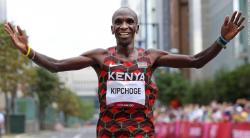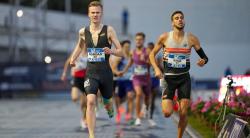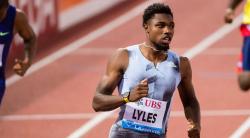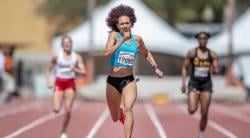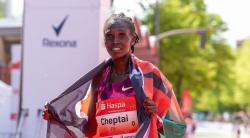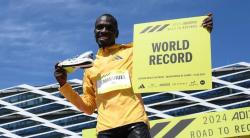European Athletics Championships Munich 2022 Day Two Report
.jpg/women's%20100m%20final%20zurich%20(1)__800x500.jpg)
Men's 100m final
Marcell Jacobs won the 100m final in 9.95 adding the European gold medal to the Olympic gold medal in Tokyo 2021, the World Indoor title in the 60 metres in Belgrade last March and the European Indoor gold medal in the 60 metres in Torun 2021. Jacobs equalled the championship record set by Zharnell Hughes in Berlin 2018.
Marcell Jacobs: “This was a difficult season with injury problems, but I am not happy about how the race went technically, there were problems. I am over the moon with the gold medal. After the Olympic, now I got the European gold. I have to get the world championships gold now. We also look forward to the relay because the Italian team also wants to excel there”.
After a difficult season troubled by a muscle injury, which affected his preparation for the World Championships in Eugene, Jacobs could celebrate his gold medal in a packed Olympic Stadium in Munich in front of enthusiastic fans.
Zharnel Hughes won the silver medal in 9.99 four years after his European gold medal in Berlin. Another British sprinter Jeemiah Azu improved his PB to 10.13 to take the bronze medal. Azu won the British Championships in Manchester In a wind-assisted 9.90 last June, but he could not be selected for the World Championships in Eugene as he did not achieve the qualifying time.
Semifinals 100 metres:
Defending European champion Zharnel Hughes cruised through to a win in the first 100m semifinal in 10.03 ahead of European under 23 champion Jeremiah Azu (10.17) and Jimmy Vicaut (10.18).
European silver medallist Reece Prescod won the second semifinal in 10.10 edging Italy’s Chituru Ali, who improved his PB by 0.03 to 10.12.
Olympic champion Marcell Jacobs showed that he is back to top form with a win in the third semifinal in a seasonal best of 10,00 easing down in the final 30 metres.
Women’s 100 metres:
German sprint Gina Luckenkemper won the women’s 100 metres final edging world indoor Mujinga Kambundji from Switzerland by 5 thousandths of a second with 10.99 to the delight of German fans. Luckenkemper had won the European silver in Berlin 2018. Luckenkemper desperately lunged tumbling to the track and needed treatment to a bleeding hand.
Darriyl Neita from Great Britain won bronze medal in 11.00. Ewa Swoboda placed fourth in 11.18. Dina Asher Smith pulled up injured at halfway and jogged over the line.
Gina Luckenkemper: “Fans in the stadium created a crazy atmosphere. I am grateful to them. I don’t remember the race because I had a lot of adrenaline”.
Semifinals 100 metres:
Darryl Neita ran the fastest time in the women’s 100 metres with 10.95 beating German champion Gina Luckenkemper (11.11). Imani Lansiquot from Great Britain and Zaynab Dosso advanced to the final as the fastest non-automatic qualifiers in this semifinal with 11.23 and 11.28.
Dina Asher Smith advanced to the final easily with a win in the second semifinal in 11.15.
Kambundji won the third semifinal with 11.05 beating Ewa Swoboda from Poland (11.22).
Men’s long jump:
Olympic champion Miltiadis Tentoglou set a championship record of 8.52m on his fourth attempt to win his second consecutive European outdoor gold medal. The Greek star backed up this result with the second and third best jumps of 8.35m and 8.23m, which would have been enough to win the competition.
Thobias Montler from Sweden won the silver medal with 8.06m beating Frenchman Jules Pommery on countback.
Miltiadis Tentoglou: “The final was like a different story. This time I was ready and prepared for something big. I proved that I can do it. I put everything together and it worked well”.
Men’s 5000 metres:
Olympic champion Jakob Ingebrigtsen won his second consecutive European 5000 metres gold medal in 13:21.13 four years after his first triumphs in the 1500m and 5000m in Berlin 2018. Ingebrigtsen could achieve the “double-double”, if he wins his second 1500m European title later this week. Mohamed Katir from Spain won the silver medal in 13:22.98. Yeman Crippa held on to finish third in 13.24.83 four years after his bronze medal in the 10000m in Berlin 2018.
Andreas Almgren from Sweden improved his PB to 13:26.48 to finish fourth.
Jakob Ingebrigtsen: “It’s great to see many people in the stadium. It’s nice to hold these these Championships in Germany. Everybody has expectations and have to learn to deal with them. I believe in myself, and I believe in the things I have done before. It was a great race to be part of. Thanks to the crowd. It’s incredible It feels great to be back and win. It is special. It brings back the memories of Berlin. I am looking forward to it. I always have something to prove”.
Women’s discus throw:
Sandra Perkovic has become the first athlete in European Championships history to win six individual gold medals with her win in the women’s discus throw.
Perkovic unleashed the winning mark of 67.95m in the fifth round overtaking German Kristin Pudenz, who was leading with 66.93m in the third round. Pudenz came very close to Perkovic with a throw of 67.87m in the sixth round.
Perkovic equalled Marita Koch’s record of six gold medals at these championships. The East German sprinter won three individual 400m titles and three 4x400 relay gold medals.
Claudia Vita from Germany won the bronze medal with 65.20m. Jorinde Van Klinken from the Netherlands finished fourt with 64.43m
Sandra Perkovic: “I am so happy and proud tonight. I have just won my sixth European title at this beautiful stadium, in front of this amazing crowd. I had to fight against the Germans again,just like in Berlin 2018. I struggled a bit as they were fighting so much and improving their personal best and seasonal best. I knew I was ready to do it and I think the fight was nice”.
Decathlon (second day):
Nicklas Kaul was ranked seventh after eight events, but he set a championship record with 76.05m in the javelin to reduce his gap on Ehammer to just 178 points.
Kaul crossed the finish-line in the 1500 metres in 4:10.04 with a huge gap of 38 seconds over overnight leader Simon Ehammer. Kaul celebrated the win in front of his home fans with 8545 points.
In the first three events of the second day the decathlete from Mainz clocked 14.45 in the 110m hurdles, threw 41.80m in the discus and vaulted 4.90m in the pole vault.
Nicklas Kaul: “The noise was just crazy. Winning here like this means much more to me than my world title in Doha three years ago”.
Ehammer clocked 4:48.72 to win the silver medal with a national record of 8468 points. Janek Oiglane won the bronze medal with 8364 after producing a throw of 70.94m in the javelin. Marcus Nilson from Sweden improved his PB to 8327 points to finish fourth 8327 points. Maicel Uibo from Estonia took fifth place with 8234 points. Dario Dester broke the Italian record with 8218 points to finish sixth.
Ehammer set the fastest time in the 110 metres hurdles, clocking 13.75 in the opening event of the second day to maintain his overall lead with 5668 points. Dester clocked the fifth fastest time with 14.44 to hold on to his second place in the overall standing with 5245 points ahead of Estonia’s Janek Oiglane (5133 points). Adam Sebastian Helcelet from Czech Republic clocked the second fastest time with 14.39 ahead of Oiglane (14.42).
Ehammer finished 17th with 34.92m in the discus throw in one of his weakest events. Karel Tilga from Estonia produced the best throw of 49.91m. Dester improved his discus throw PB to 43.04m
Ehammer set his PB with 5.20m in the pole vault to take his total tally to 7202 points. Uibo cleared 5.30m to move up to third place with 6788 points. Dester needed three attempts at 4.80m and 4.90m to maintain his second place with 6852 points. Less than 100 points separated Dester from sixth placer Sander Skotheim from Norway, who cleared 5.00m in the pole vault.
Men’s 35 km walking race:
Miguel Angel Garcia from Spain won the European gold medal in the 35kmwaling race in 2h26:49 on the 17-and-a-half lap course in Odeonsplatz in the heart of Munich old town. Garcia won the European gold medal in the 20 km in Zurich and the world title over the same distance in Beijing 2015.
Miguel Angel Garcia: “Leading from the front on my own made it hard to keep the pace. It was a bit of a risk but it paid off. I felt strong and managed to maintain the pace throughout the race”.
Christopher Linke from Germany won the silver medal in 2:29:30.
Christopher Linke: “To get my first medal here in Germany is so special. I can’t believe I have done it after Covid and just two weeks of training. I didn’t finish in the 20 km in Eugene and tested positive to Covid before the 35 km race. I had ten days with no training, and then this, bit sometimes when you are free in your head, you can walk easier”.
Matteo Giupponi from Italy crossed the finish-line third in a lifetime best of 2:32:31. Giupponi pulled away from Manuel Bermudez from Spain with 6 km to go.
Giupponi, who is coached by former world 50 km medallist Gianni Perricelli, had previously competed at high levele in the 20 km finishing eighth at the Olympic Games in Rio de Janeiro 2016.
Matteo Giupponi: “I have chased this medal for a long time. Since my eight place at the Olympic Games in Rio de Janeiro I have fought against many injuries, but I have received the support from my partner and colleague Eleonora Giorgi, who will give birth to a child later this year. I like the new 35 km distance. I have worked over this distance In training to prepare these championships”.
Women’s 35 km walking race:
Antigoni Ntrismpioti from Greece won the biggest title of her career so far in the wome’s 35 km walking race by more than two minutes in 2:47:00.
Ntrimpioti pulled away from Spain’s Raquel Gonzalez at 24 km. Gonzalez won silver In a lifetime best of 2:4910. Viktoria Madarasz took bronze medal in a lifetime best of 2:49:58 ahead of Federica Curiazzi from Italy, who crossed the finish-line in 2:52:06.
Antigoni Ntrismpioti: “I am very happy to get my first major medal at the age of 38. I worked really hard for it at 38. I thought from the start of the race that I was going to win, but I had to be patient with the pace. The game was more with the Spanish girl than with the Hungarian girl who went out too fast, but it came good for me in the end”.
Women’s long jump qualifying round:
Olympic champion and double world gold medallist Malaika Mihambo started with a foul in the first round, but she secured her qualifying spot in the final with a jump of 6.99m in the second round, exceeding the qualifying mark of 6.75m.
Mihambo won her second consecutive world title in Eugene with 7.12m, but she was tested positive to covid on her return to Germany and was not able to train for ten days.
Malaika Mihambo: “In the first attempt, I had some technical problems. I missed the board and I was far from my mark so then I pushed a bit forward and the jump was good. In the end, I was quite happy with the jump. I was sick for two weeks after the World Championships. I got Covid. It did not bother me too much. It was for five days, but I could not train properly for another eight days, so it took some time. I am feeling quite after it so I am I am looking forward to the final”.
World and European silver medallist Maryina Beck Romanchuk from the Ukraine improved her seasonal best to 6.87m. Former European under 20 champion Milica Gardasevic equalled her PB with 6.83m to secure her spot in the final. Jasmin Sawyers from Great Britain, who won the European silver medallist in Amsterdam 2016, got through to the final with a leap of 6.60m.
European indoor champion Ivana Vuleta achieved the best result of 6.67m in the second qualifying round. World indoor under 20 record holder Larissa Iapichino from Italy and European indoor silver medallist Khaddi Sweden also reached the final with 6.60m and 6.59m.
Qualifying round men’s high jump:
Thomas Carmoy from Belgium, Marco Fassinotti from Italy and Tihomir Ivanov from Bulgaria had a clean sheet until 2.21m.
Gianmarco Tamberi cleared 2.17m in his first attempt and 2.21m at the second time of asking in the qualifying round of the men’s high jump.
Semifinals women’s 400 meres:
Olympic 400 metres hurdles bronze medallist Femke Bol eased through to the final with a win in the semifinal in the 400 metres in 50.60. Natalia Kaczmarek and Anna Kielbasinska ran the two fastest two times of the three times by winning their respective semifinal in 50.40 and 50.45. Victoria Ohruogu finished second behind Kaczmarek improving her PB to 50.50.
Semifinals men’s 400 metres:
World bronze medallist Matthew Hudson Smith won the first 400m semifinal in 44.98. European under 23 champion Ricky Petrucciani from Switzerland qualified for the final in second place with 45.55. Thomas Jordier from France and Liemarvin Bonevacia won the other two semifinals in 45.37 and 45.50.
Women’s 1500 metres semifinals:
Laura Muir launched her kick in the final 50 metres to win the first semifinal in 4:06.40 ahead of Ludovica Cavalli (4:06.59). Sofia Ennaoui from Poland, European silver medallist in Berlin 2018, pulled away from Clara Mageean from Ireland in the final 50 metres to win the second semifinal in 4:02.73.
Men’s 3000 metres steeplechase heats:
Osama Zoghlami won the first 3000m steeplechase heat in 8:30.67 ahead of Karl Bebendorf from Germany (8:31.67) and Tom Karbo from Norway (8:32.22). Olympic and world finalist Ahmed Abdelwahed took the win in the second heat with 8:30.92 ahead of Norway’s Jacob Boutera (8:31.03).

